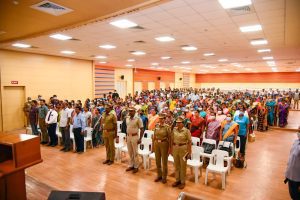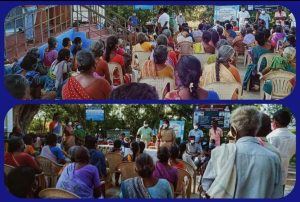Programme, launched in June, has covered 1 lakh students across 650 schools; seven POCSO cases registered till now.

Project Pallikoodam by Coimbatore Police has so far covered around one lakh students in 650 schools. (Supplied)
On 18 September, the Pollachi all-women police arrested the 62-year-old owner of a grocery shop from a village near Anaimalai in Coimbatore for sexually abusing 15 minor girl students.
The arrest came after a 13-year-old student told the headmistress of her school that she was molested by the grocery shop owner when she visited his shop. When the headmistress made enquiries, 14 other minor girls came forward with similar complaints.
The headmistress filed a complaint, following which the Coimbatore police arrested the grocery shop owner.
In another case, under the jurisdiction of Coimbatore rural police, a 17-year-old was booked for compelling his girlfriend, also a minor, to make nude video calls — and threatening to make public other nude videos of hers if she failed to agree.
After a lot of hesitation, the girl came forward to file a complaint based on which a case was registered against the 17-year-old.
What ties together these two unrelated incidents is something called “Project Pallikoodam” — an awareness programme by Coimbatore police that empowered these students to come forward and share their experiences.
When IPS officer Badri Narayanan took charge as the Superintendent of Police in Coimbatore on 24 March, 2022, he was shocked to see the number of cases pending under the Protection Of Children from Sexual Offences Act (POCSO) in just the rural jurisdiction of the district.
Over 140 such cases were pending, which were yet to be charge sheeted. This prompted him to prioritise child sexual abuse cases.
While the investigation and the charge sheet were important, Narayanan, as well as Inspector General of Police (West Zone) R Sudhakar, felt there was a need to spread awareness among children, parents and teachers about POCSO.
That’s how, with the help of IG Sudhakar, the Coimbatore police came up with “Project Pallikoodam” — an initiative where cops directly address students in both government and private schools to make them aware about sexual offenses and the legal remedies available to them.
And doing all this in a manner that is easily comprehensible.
The programme — which started in June this year and has so far covered around one lakh students across 650 schools — has already shown results: As many as seven POCSO cases have been registered based on complaints by students who participated in the awareness workshops.
For example, according to the Coimbatore police, the minor girl who was threatened by her boyfriend came forward to lodge a complaint only when she realised, after attending a “Project Pallikoodam” workshop, that she was not the one at fault. Rather, she was a victim.
“When an adult has a problem, they know the remedies before them. They know they can approach the police. But that’s not the case with children. Sometimes, they are not even aware that what’s happening with them is a crime, forget about coming forward to lodge a complaint,” Coimbatore SP Badri Narayanan told South First.
“In other instances, even if they know something wrong is happening to them, they are reluctant to open up even to their parents,” he added, explaining the the rationale behind the awareness programme.
“Apart from parents and teachers, children view police as a credible and authentic source of information. That’s the reason why we wanted to reach out to the kids directly so that they are well aware and empowered,” Badri Narayanan said.
Apart from encouraging children to come forward and talk about experiences of sexual abuse, “Project Pallikoodam” has also helped the police crack down on eve-teasing cases and the drug trade targeting students, apart from helping children who have trouble with an abusive or alcoholic parent.
In Phase 1 of “Project Pallikoodam”, Coimbatore police officials held an orientation meeting for the principals and teachers of government and private schools.

Photo of the orientation meeting held by Coimbatore police for school authorities as part of Project Pallikoodam. (Supplied)
After the orientation, two trained personnel from each police station were sent to schools to address the students in groups of 20-30 based on their age. The smaller the group, the better, Coimbatore police believed.
For the first category of students, those in the age group six to 10, the cops explained the basics: What is a good touch and bad touch? Adult behaviour and what is right and wrong. And what to do and what not to do in problematic situations.
As for the teens, or children studying in Classes VI to XII, the workshop explained the POCSO Act, its implications, cyber space safety, etc. For this age group, the workshops were held separately for boys and girls.
Further, the police personnel in charge for each school were asked to keep in regular touch with the students and school authorities even after the awareness class. And teachers and school authorities were told not to hide or neglect any complaints by the students.
While Coimbatore police have managed to reach out to a significant number of students since the launch of “Project Pallikoodam”, Badri Narayanan hopes to cover all the 990 schools under the Coimbatore rural limit by December this year.
As for Phase II of the project, Class XI students have personal interactions with the IG, DIG and SP. They are also taken on a trip to the rifle club in Coimbatore. These measures are meant to instill confidence about the police among children, top officials said.
Speaking to South First, IG Sudhakar listed similar programmes being undertaken by other districts in the Western zone of Tamil Nadu, each targeting specific issues pertaining to their respective regions.

Awareness sessions conducted for villagers by Erode police as part of the ‘Kaakum Karangal’ initiative. (Supplied)
For instance, the Erode police launched the “Kaakum Karangal” (Hands that will Protect) initiative to empower children to fight against “exploitation in the form of child marriage and sexual abuse”.
As of July 2022, 4,596 campaign programmes reaching out to 1.5 lakh students, villagers and civil society had been conducted.
Importantly, the Erode police claimed that following the awareness programmes, the “child line calls increased by 42 percent, reporting of POCSO cases grew by 76.8 percent, the number of child marriages that were stopped rose by 62 percent (138 cases of potential child marriages were stopped between July 2021 to June 2022) and rehabilitation of affected girls went up by 23 percent.
Reacting to ‘Project Pallikoodam’ and ‘Kakkum Karangal’, Andrew Sesuraj, child rights activist and a public policy consultant at the Tamil Nadu State Planning Commission, told South First that initiatives like these must be emulated across the state.
“The more children are talked to about sexual abuse, the better. It’s important that we break the culture of silence. Even in case of other outreach programmes, we see students opening up about their bad experiences. Now, when it comes from the police, it will create trust and confidence among children to come forward and speak out. Initiatives like these must be scaled up,” he said.

May 12, 2024

May 12, 2024

May 12, 2024

May 01, 2024

Apr 28, 2024

Apr 26, 2024